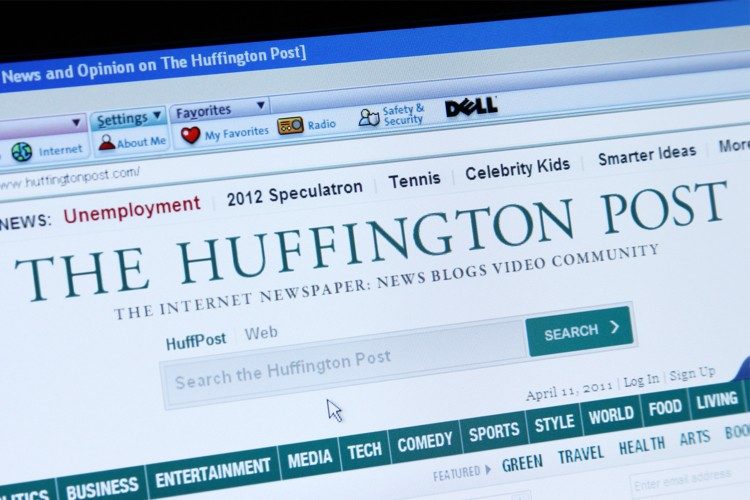
How the mighty have fallen.
Reeling from declining readership and relevance, the far-left HuffPost will be sold by Verizon Media to BuzzFeed in an all-stock deal.
Verizon Media has reportedly been looking for a buyer for HuffPost for years. Founded as The Huffington Post by BuzzFeed founder and CEO Jonah Peretti, Arianna Huffington, and media mogul Ken Lerer, the outlet was once one of the highest-trafficked news sites on the Internet, leveraging bold headlines and a broad network of contributors to scale quickly.
But an over-reliance on social media for content distribution and a lack of strategic vision domed the site, causing its prominence to wane over the years. It was one of many websites from throughout the political spectrum that was hard-hit by changes to Facebook’s algorithm that drastically reduced the reach of pages (in favor of content from friends) and prioritized content from establishment outlets such as CNN and MSNBC.
HuffPost has never been subtle about its liberal slant. Since 2016, it has famously added a disclaimer to stories about President Trump that reads “Note to our readers: Donald Trump is a serial liar, rampant xenophobe, racist, misogynist, birther and bully who has repeatedly pledged to ban all Muslims — 1.6 billion members of an entire religion — from entering the U.S.”
Ideologically, it’s right in line with new owner BuzzFeed, which also has a news division — BuzzFeed News. Like HuffPost, BuzzFeed grew through catchy, highly-shareable content.
Under the deal, which is expected to close at the beginning of next year, BuzzFeed News and HuffPost will remain separate news organizations. Their social channels and apps will likewise remain independent, and an editor-in-chief specific to HuffPost will be hired.
After selling HuffPost, Verizon Media will invest in BuzzFeed, taking a minority stake in the company.
According to an internal memo sent from Peretti to staff, little will change in the short term on a day-to-day-basis. “Our business strategy is to make sure that the two newsrooms maintain their own identities to preserve the big and loyal audiences that each has built up,” he wrote.
Axios reports:
What’s in it for BuzzFeed? Scale for cheap.
BuzzFeed will add HuffPost to its network of big internet brands that perform well on social media and are good for selling commerce, like Tasty.
In a memo to employees about the deal obtained by Axios, Peretti said “HuffPost is one of the few digital content brands that is universally known, with significant scale, and a passionate, loyal audience that is different from ours.”
What’s in it for HuffPost? A lifeline.
Verizon has had to write down nearly half of its media investments that stem from pricey acquisitions of sites like AOL and Yahoo.
AOL bought HuffPost for $315 million in 2011. At the time, HuffPost’s sale was considered one of the most successful venture capital exits in media.
The companies reportedly hope to “unlock revenue for both companies through content syndication, new sales opportunities, commerce and [augmented reality].”
“Verizon Media’s strategy has evolved over the past two years to focus on our core strength — ads, commerce, content and subscriptions,” said CEO Guru Gowrappan, and Paretti added that “With the addition of HuffPost, our media network will have more users, spending significantly more time with our content than any of our peers.”
The latest acquisition is another example of the trend over recent years toward media consolidation. But in a sense it’s also another tally in the victory column. HuffPost is one of the most rabid left-wing outlets on the Internet; the fact that its readership has declined to the point that Verizon found it’s better off selling it is a good thing.
President Trump famously labeled the mainstream media “the enemy of the people,” and as nearly the entire media colludes with the Democrat Party to crown Joe Biden the 46th president (even as legal actions against voter fraud still play out), it’s become more apparent than ever before that the role of corporate journalists is not to inform, but to propagandize the public.
If the elites can sufficiently weaponize the news to convince a nation that fraud doesn’t exist when it’s right in front of their eyes, then there is no limit to what the Deep State can accomplish — and that would deal a crushing blow to liberty from which America may not be able to recover.




